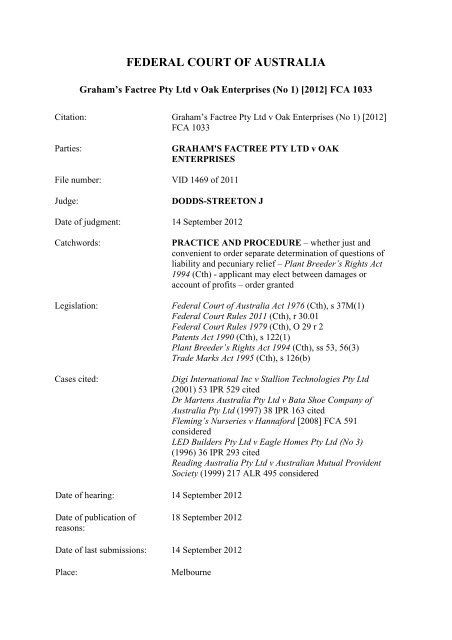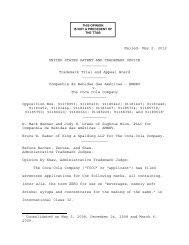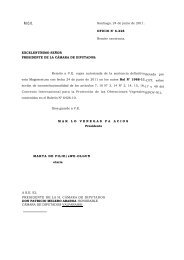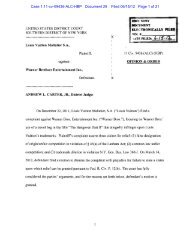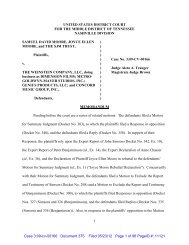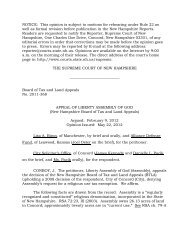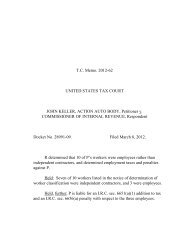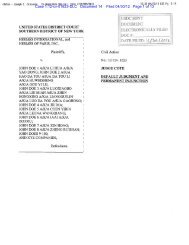Graham's Factree Pty Ltd v Oak Enterprises
Graham's Factree Pty Ltd v Oak Enterprises
Graham's Factree Pty Ltd v Oak Enterprises
You also want an ePaper? Increase the reach of your titles
YUMPU automatically turns print PDFs into web optimized ePapers that Google loves.
FEDERAL COURT OF AUSTRALIA<br />
Graham’s <strong>Factree</strong> <strong>Pty</strong> <strong>Ltd</strong> v <strong>Oak</strong> <strong>Enterprises</strong> (No 1) [2012] FCA 1033<br />
Citation: Graham’s <strong>Factree</strong> <strong>Pty</strong> <strong>Ltd</strong> v <strong>Oak</strong> <strong>Enterprises</strong> (No 1) [2012]<br />
FCA 1033<br />
Parties: GRAHAM'S FACTREE PTY LTD v OAK<br />
ENTERPRISES<br />
File number: VID 1469 of 2011<br />
Judge: DODDS-STREETON J<br />
Date of judgment: 14 September 2012<br />
Catchwords: PRACTICE AND PROCEDURE – whether just and<br />
convenient to order separate determination of questions of<br />
liability and pecuniary relief – Plant Breeder’s Rights Act<br />
1994 (Cth) - applicant may elect between damages or<br />
account of profits – order granted<br />
Legislation: Federal Court of Australia Act 1976 (Cth), s 37M(1)<br />
Federal Court Rules 2011 (Cth), r 30.01<br />
Federal Court Rules 1979 (Cth), O 29 r 2<br />
Patents Act 1990 (Cth), s 122(1)<br />
Plant Breeder’s Rights Act 1994 (Cth), ss 53, 56(3)<br />
Trade Marks Act 1995 (Cth), s 126(b)<br />
Cases cited: Digi International Inc v Stallion Technologies <strong>Pty</strong> <strong>Ltd</strong><br />
(2001) 53 IPR 529 cited<br />
Dr Martens Australia <strong>Pty</strong> <strong>Ltd</strong> v Bata Shoe Company of<br />
Australia <strong>Pty</strong> <strong>Ltd</strong> (1997) 38 IPR 163 cited<br />
Fleming’s Nurseries v Hannaford [2008] FCA 591<br />
considered<br />
LED Builders <strong>Pty</strong> <strong>Ltd</strong> v Eagle Homes <strong>Pty</strong> <strong>Ltd</strong> (No 3)<br />
(1996) 36 IPR 293 cited<br />
Reading Australia <strong>Pty</strong> <strong>Ltd</strong> v Australian Mutual Provident<br />
Society (1999) 217 ALR 495 considered<br />
Date of hearing: 14 September 2012<br />
Date of publication of<br />
reasons:<br />
18 September 2012<br />
Date of last submissions: 14 September 2012<br />
Place: Melbourne
- 2 -<br />
Division: GENERAL DIVISION<br />
Category: Catchwords<br />
Number of paragraphs: 37<br />
Counsel for the Applicant: Mr A Maryniak with Mr B Browne<br />
Solicitor for the Applicant: Griffith Hack<br />
Counsel for the Respondent: Mr T Cordiner<br />
Solicitor for the Respondent: Phillips Ormonde Fitzpatrick
IN THE FEDERAL COURT OF AUSTRALIA<br />
VICTORIA DISTRICT REGISTRY<br />
GENERAL DIVISION VID 1469 of 2011<br />
BETWEEN: GRAHAM'S FACTREE PTY LTD<br />
Applicant<br />
AND: OAK ENTERPRISES<br />
Respondent<br />
JUDGE: DODDS-STREETON J<br />
DATE OF ORDER: 14 SEPTEMBER 2012<br />
WHERE MADE: MELBOURNE<br />
THE COURT ORDERS THAT:<br />
1. Pursuant to r 30.01 of the Federal Court Rules 2011 (Cth) there be decided at a<br />
separate trial all issues of liability in the proceedings, prior to any trial, if necessary, in<br />
respect of all issues of quantum of damages and/or account of profits.<br />
2. The respondent pay the applicant’s costs of the interlocutory application dated<br />
29 August 2012.<br />
Note: Entry of orders is dealt with in Rule 39.32 of the Federal Court Rules 2011.
IN THE FEDERAL COURT OF AUSTRALIA<br />
VICTORIA DISTRICT REGISTRY<br />
GENERAL DIVISION VID 1469 of 2011<br />
BETWEEN: GRAHAM'S FACTREE PTY LTD<br />
Applicant<br />
AND: OAK ENTERPRISES<br />
Respondent<br />
JUDGE: DODDS-STREETON J<br />
DATE: 14 SEPTEMBER 2012<br />
PLACE: MELBOURNE<br />
INTRODUCTION<br />
REASONS FOR JUDGMENT<br />
1 On 14 September 2012, I made the orders set out above, for the reasons that follow.<br />
2 By an interlocutory application dated 29 August 2012, the applicant, Graham’s<br />
<strong>Factree</strong> <strong>Pty</strong> <strong>Ltd</strong>, seeks, pursuant to r 30.01 of the Federal Court Rules 2011 (Cth)<br />
(“the Rules”), an order that all issues of liability be determined prior to any trial, if necessary,<br />
in relation to issues of quantum of damages and/or account of profits (a “split trial”).<br />
3 The application was supported by the affidavit of Philip Andrew Goatcher sworn on<br />
29 August 2012 and written submissions dated 5 September 2012.<br />
4 The application was opposed by the respondent, <strong>Oak</strong> <strong>Enterprises</strong>. The affidavits of<br />
John Paton sworn on 11 September 2012 and Christopher Schlicht sworn on 11 September<br />
2012, together with written submissions dated 11 September 2012, were filed in opposition.<br />
5 Rule 30.01 of the Rules relevantly provides:<br />
30.01 Application for separate trials<br />
(1) A party may apply to the Court for an order that a question arising in the<br />
proceeding be heard separately from any other questions.
BACKGROUND<br />
6 The applicant, which conducts a nursery selling, inter alia, fruit trees, owns exclusive<br />
- 2 -<br />
rights conferred by the Plant Breeder’s Rights Act 1994 (Cth) (“the Act”) in relation to an<br />
apple plant variety called “Rosy Glow”. The applicant alleges the respondent<br />
(which conducts an orchard business growing and selling fruit) infringed its plant breeder’s<br />
rights in Rosy Glow by, in relation to “propagating material of the variety”, producing,<br />
selling and stocking the material and licensing such acts without its authority, in<br />
contravention of s 53 of the Act. The respondent’s alleged infringing apple plant variety was<br />
called “Ruby Pink”.<br />
7 Section 56(3) of the Act provides that the Court may grant an injunction in a<br />
proceeding for infringement of plant breeder’s rights and “at the option of the plaintiff, either<br />
damages or an account of profits”. As with a number of other intellectual property<br />
proceedings, the applicant must make an election between damages or an account of profits,<br />
but cannot be compelled to do so before all the evidence is in. In consequence, unless a split<br />
trial is ordered, the parties will have to call evidence on both damages and an account of<br />
profits. (See also s 122(1) Patents Act 1990 (Cth) and s 126(b) Trade Marks Act 1995 (Cth)).<br />
LEGAL PRINCIPLES<br />
8 The principles governing the Court’s exercise of its discretion to order a split trial<br />
were not disputed. They were summarised by Branson J in Reading Australia <strong>Pty</strong> <strong>Ltd</strong> v<br />
Australian Mutual Provident Society (1999) 217 ALR 495 (“Reading”) at [8]. Her Honour<br />
observed, inter alia, (in relation to O 29 r 2 of the Federal Court Rules 1979 (Cth)<br />
(the predecessor of r 30.01)) that:<br />
(f) factors which tend to support the making of an order under O 29 r 2 include<br />
that the separate determination of the question may:<br />
(i) contribute to the saving of time and cost by substantially narrowing<br />
the issues for trial, or even lead to disposal of the action; or<br />
(ii) contribute to the settlement of the litigation (CBS Productions <strong>Pty</strong><br />
<strong>Ltd</strong> v O’Neill per Kirby P at 607);<br />
(g) factors which tell against the making of an order under O 29 r 2 include that<br />
the separate determination of the question may:<br />
(i) give rise to significant contested factual issues both at the time of the<br />
hearing of the preliminary question and at the time of trial (GMB
- 3 -<br />
Research & Development <strong>Pty</strong> <strong>Ltd</strong> v Commonwealth [1997] FCA<br />
934);<br />
(ii) result in significant overlap between the evidence adduced on the<br />
hearing of the separate question and at trial — possibly involving the<br />
calling of the same witnesses at both stages of the hearing of the<br />
proceeding: GMB Research & Development <strong>Pty</strong> <strong>Ltd</strong> v<br />
Commonwealth; Arnold v Attorney-General (Vic) (unreported, Fed C<br />
of A, Sundberg J, Nos VG629–37 of 1995, 8 September 1995,<br />
BC9502745). This factor will be of particular significance if the<br />
court may be required to form a view as to the credibility of<br />
witnesses who may give evidence at both stages of the hearing of the<br />
proceeding; or<br />
(iii) prolong rather than shorten the litigation (GMB Research &<br />
Development <strong>Pty</strong> <strong>Ltd</strong> v Commonwealth).<br />
9 It was common ground that in intellectual property cases involving patents, trade<br />
marks or plant breeder’s rights, it is customary to hear and determine issues of liability prior<br />
to issues of pecuniary relief. As Kenny J recognised in Fleming’s Nurseries v Hannaford<br />
[2008] FCA 591 (“Fleming’s Nurseries”), this is principally because the need which would<br />
otherwise arise to lead evidence on both damages and an account of profits is avoided.<br />
Kenny J stated at [18]:<br />
It is customary in intellectual property cases, however, to hear and determine issues<br />
of liability separately and before issues of pecuniary relief. This is largely because it<br />
is generally thought just and convenient to so order on account of the fact that an<br />
applicant in such a case is not compelled to make an election as between damages<br />
and an account of profits at least before the evidence on liability has been received …<br />
Under s 56(3) of the PBRA, in an action for infringement, Canada is entitled to make<br />
an election for damages or an account of profits. That is, the nature of Canada’s<br />
case attracts the same considerations as other intellectual property cases requiring<br />
an election between the remedies in the event that liability is established. (emphasis<br />
added)<br />
10 In Reading, Branson J made a like acknowledgement at [9] where her Honour<br />
concluded:<br />
Ultimately the issue for the Court to determine when consideration is being given to<br />
the making of an order under O 29 r 2 is whether it is “just and convenient” for the<br />
order to be made (Arnold v Attorney-General for the State of Victoria). There are<br />
classes of proceedings in which it is commonly recognised that it is just and<br />
convenient for an order under O 29 r 2 to be made. One such class is proceedings<br />
concerning intellectual property rights where an applicant can not be compelled to<br />
make an election as between damages and an account of profits at least until all of<br />
the evidence has been received so that, if an order has not been made separating the<br />
determination of the issues of liability and relief, the parties will have to call<br />
evidence to deal with both damages and an account of profits (Dr Martens Australia<br />
<strong>Pty</strong> <strong>Ltd</strong> v Bata Shoe Company of Australia <strong>Pty</strong> <strong>Ltd</strong> (1997) 75 FCR 230)… (emphasis<br />
added)
APPLICANT’S SUBMISSIONS<br />
11 The applicant submitted that ordering a split trial would be “just and convenient” as it<br />
- 4 -<br />
would “facilitate the just resolution of [the dispute] … as quickly, inexpensively and<br />
efficiently as possible”, in accordance with the “overarching purpose” stated in s 37M(1) of<br />
the Federal Court of Australia Act 1976 (Cth). A split trial would avoid the need for further<br />
discovery, interrogation, preparation of evidence and submissions directed to issues of<br />
pecuniary relief, thus saving the parties’ time and expense and the Court’s resources. A split<br />
trial would also accord with orthodox practice in intellectual property proceedings where an<br />
election is to be made about pecuniary relief. (See Dr Martens Australia <strong>Pty</strong> <strong>Ltd</strong> v Bata Shoe<br />
Company of Australia <strong>Pty</strong> <strong>Ltd</strong> (1997) 38 IPR 163 (“Dr Martens”) at 165–167).<br />
12 The applicant also submitted that:<br />
• should it fail to establish liability, no evidence would be needed in relation to<br />
pecuniary relief;<br />
• should it be successful in establishing liability, there was a strong prospect the parties<br />
would settle on issues of pecuniary relief; and<br />
• should it succeed on the issue of liability, it would be entitled to injunctive relief,<br />
which would operate as an “end point” to the respondent’s alleged infringing conduct.<br />
APPLICANT’S EVIDENCE<br />
Affidavit of Philip Goatcher<br />
13 The applicant relied on the affidavit of Philip Goatcher, a partner of its solicitors,<br />
sworn on 29 August 2012. Mr Goatcher deposed to correspondence about a split trial.<br />
A letter from the respondent’s solicitors dated 28 February 2012 stated that the respondent<br />
reserved its right to seek a prior separate trial of liability from issues of quantum, pursuant to<br />
r 30.01 of the Rules. The applicant’s solicitors’ letter dated 21 August 2012 proposed a “split<br />
trial” on the basis that it would achieve a significant saving of the Court’s and the parties’<br />
time and resources. By a letter dated 27 August 2012, the respondent’s solicitors rejected the<br />
proposal, stating that it would be prejudicial to the respondent, particularly given its effort<br />
and expense in providing discovery. The letter complained that the applicant’s discovery was<br />
deficient and suggested that the proposal for a split trial was made to avoid discovery<br />
obligations. The letter also stated that a split trial would make settlement difficult, as the
- 5 -<br />
applicant was an assignee of the right after the alleged infringing conduct, and if damages<br />
were claimed based on lost royalty payments to the assignor, the preparation of evidence<br />
would not be particularly onerous.<br />
RESPONDENT’S SUBMISSIONS<br />
14 The respondent submitted that an order for a split trial would not be “just and<br />
convenient” for a number of reasons.<br />
15 First, while acknowledging that a split trial would ordinarily save costs, the<br />
respondent submitted that it had already incurred a majority of its costs through discovery<br />
and preparation of an expert report in relation to quantum. The respondent submitted that a<br />
split trial would be “prejudicial and procedurally unfair”, as it has already provided full<br />
discovery, and the applicant had inspected confidential documents while failing, despite<br />
repeated requests, to comply with its discovery obligations in relation to quantum.<br />
The respondent alleged that the applicant sought a split trial to avoid its discovery<br />
obligations.<br />
16 Secondly, the respondent submitted that if the applicant succeeded on liability,<br />
settlement on issues of pecuniary relief was highly unlikely, as the applicant had refused to<br />
discover documents which would identify its customers or enable the respondent to calculate<br />
the profit per sale of the “Rosy Glow” variety. Accordingly, a split trial would prolong the<br />
proceeding and deprive the respondent of an understanding of how the applicant would put its<br />
case in relation to quantum, thus reducing the prospects of settlement before liability was<br />
determined.<br />
17 Thirdly, the respondent submitted that as it had ceased to engage in the impugned<br />
conduct, an “end point” had already been reached, from which the parties could determine the<br />
quantum of any pecuniary relief.<br />
18 Fourthly, the respondent submitted that there would probably be an overlap between<br />
the evidence on liability and quantum. The respondent anticipated that there would be<br />
cross-examination of at least one of the applicant’s witnesses (its director, Mr Fleming) on<br />
both issues.
19 Fifthly, the respondent submitted that both parties anticipated the use of expert<br />
- 6 -<br />
evidence, and the proceeding had and would continue to be protracted in any event. A split<br />
trial would not shorten the matter in any real sense.<br />
RESPONDENT’S EVIDENCE<br />
Affidavit of Christopher Schlicht<br />
20 Christopher Schlicht, a partner of the respondent’s solicitors, deposed that the<br />
respondent reserved the right to apply for a split trial in February 2012, prior to a first<br />
directions hearing or the making of any orders. At that stage, the respondent was seeking<br />
details of how the applicant put its case. Mr Schlicht deposed that the proposal for a split<br />
trial was not raised again until the applicant’s letter dated 21 August 2012.<br />
21 Mr Schlicht deposed that standard discovery was ordered by 20 April 2012.<br />
The respondent made discovery on the basis that there would be no split trial. The applicant,<br />
however, did not discover any documents relevant to quantum in its list of documents dated<br />
20 April 2012. Mr Schlicht deposed that despite many requests for further discovery of<br />
documents relevant to quantum, the applicant’s discovery remained inadequate.<br />
22 Mr Schlicht also deposed to his complaints about the adequacy of a summary<br />
document provided by the applicant, which set out sales and royalty payments information.<br />
The complaint was first outlined in a letter dated 23 July 2012 and repeated in a letter dated<br />
7 August 2012, following a letter from the applicant’s solicitors dated 31 July 2012 denying<br />
that the requested information was relevant. Mr Schlicht further deposed that unless the<br />
applicant’s position on quantum were clarified, the parties were highly unlikely to settle on<br />
that issue should a split trial be ordered.<br />
23 Mr Schlicht also deposed that Mr Fleming, a director of the applicant, would likely be<br />
called by the respondent for cross-examination on both quantum and liability.<br />
24 Mr Schlicht referred to transcript of a directions hearing in the matter on 5 March<br />
2012, where counsel for the applicant indicated that the parties were likely to rely on expert<br />
evidence. On that basis, he deposed that the evidentiary stages in the proceeding would<br />
probably be complete in early 2013, providing sufficient time for the applicant to frame and<br />
put forward its case in relation to quantum.
Affidavit of John Paton<br />
25 The respondent also relied on the affidavit of John Paton, its Chief Executive Officer,<br />
- 7 -<br />
sworn on 11 September 2012. Mr Paton deposed that the respondent, as a non-for-profit<br />
organisation, tried to minimise any potential exposure by ceasing to engage in the alleged<br />
infringing conduct. It had ceased, and requested its licensees to cease, budding and<br />
propagation of the “Ruby Pink” variety and had ceased to sell “Ruby Pink” trees.<br />
26 Mr Paton deposed that the respondent had discovered its documents on the basis that<br />
both liability and quantum were in issue.<br />
DISCUSSION<br />
27 As the respondent submitted, the “norm” in litigation is that all facts and issues in a<br />
proceeding be determined at the one time. Intellectual property cases involving patents, trade<br />
marks and plant breeder’s rights nevertheless constitute a distinct group, as an order for split<br />
trials is much more usual than not, principally because (as recognised in authorities including<br />
Dr Martens, LED Builders <strong>Pty</strong> <strong>Ltd</strong> v Eagle Homes <strong>Pty</strong> <strong>Ltd</strong> (No 3) (1996) 36 IPR 293 and<br />
Fleming’s Nurseries) it avoids the need to lead evidence on both damages and an account of<br />
profits.<br />
28 In addition to the above advantage, a separate trial on liability would, if the applicant<br />
in this case were unsuccessful, avoid the need for a trial on quantum altogether, and thus<br />
dispose of the entire matter. The parties would otherwise have to prepare and lead evidence<br />
in relation to the assessment and calculation of both damages and profits, all or much of<br />
which may ultimately be unnecessary.<br />
29 The respondent’s principal objection to a split trial was that it had already, in effect,<br />
given discovery and prepared an expert evidence report on quantum in circumstances where<br />
the applicant took the benefit without reciprocating, as it made no sufficient discovery<br />
relevant to quantum, and refused to clarify its position on loss. The applicant had failed to<br />
state whether it claimed loss confined to that assigned to it, or whether it would seek only lost<br />
royalties from the respondent to the registered owner, rather than lost sales as a result of the<br />
respondent’s conduct.
30 The respondent submitted that in the circumstances, it had nothing to gain from a split<br />
- 8 -<br />
trial, and, given the timing and context of its application, the applicant would secure an unfair<br />
advantage.<br />
31 While an order for a split trial would be likely to obviate disputes about the adequacy<br />
of the applicant’s discovery or its particulars of loss and damage, it would confer no other<br />
obvious forensic advantage. Further, the assessment of whether it was appropriate to order a<br />
split trial could not be conflated with the respondent’s related, but distinct, complaints about<br />
the adequacy of the applicant’s discovery on quantum and its alleged failure to clarify how it<br />
put its case thereon. The respondent had not sought relief in relation to such complaints,<br />
although it was open to it to do so. The respondent acknowledged that since 20 April 2012,<br />
while the parties attempted to resolve outstanding discovery issues, the applicant provided a<br />
number of documents relevant to quantum of alleged loss and damage and a summary<br />
document setting out sales of Rosy Glow and royalty payments. The respondent alleged that<br />
the applicant’s discovery was inadequate because it did not permit the respondent to calculate<br />
the applicant’s profit per sale or to identify its customers. Nevertheless, the respondent<br />
conceded that such matters would be relevant only if the applicant sought damages for profits<br />
it lost prior to the assignment or for sales lost to the respondent.<br />
32 The respondent, by correspondence in July 2012, sought clarification on those issues,<br />
which the applicant refused to provide, on the basis that it had not yet made an election as to<br />
damages or an account of profits.<br />
33 In the context of the present application, it was not possible to determine the<br />
respondent’s complaints about discovery, which were, in a sense, merely contingent, and<br />
were disputed by the applicant.<br />
34 Further, it was clear that a separate trial on liability could eliminate any need for a<br />
trial on quantum. Although the respondent had already given discovery and prepared some<br />
relevant evidence, the further preparation, time and costs consumed by a trial on quantum<br />
was, even from the respondent’s perspective, likely to be considerable. The respondent’s<br />
argument that the issue of quantum was unlikely to be complex or involve significant<br />
preparation and time was inherently weakened by the complaint that the respondent was not,<br />
at this stage, aware of how the applicant would put its quantum case. Experience indicated,
- 9 -<br />
however, that the hearing and determination of quantum issues relevant to both damages and<br />
an account of profits would greatly expand the effort, time and costs of the parties and the<br />
court. (See, in that context, Digi International v Stallion Technologies (2001) 53 IPR 529 at<br />
[34]-[35]).<br />
35 As mediation had already been attempted without success, I accepted that an order for<br />
a split trial was unlikely to promote settlement prior to the conclusion of a trial on liability.<br />
36 While some overlap of issues could not be excluded, the applicant denied that its chief<br />
executive officer would, as the respondent suggested, give evidence on both liability and<br />
quantum. No other person was identified as likely to give evidence on both liability and<br />
quantum. Some degree of overlap was not, in any event, decisive. Further, while the<br />
respondent contended that its cessation of the alleged infringing conduct constituted an end<br />
point, the applicant did not accept that cessation was established.<br />
37 While the matter was likely to be protracted and complex, a separate trial on liability<br />
would ameliorate, rather than aggravate, the difficulties. The potential avoidance of the need<br />
for any trial on quantum and further preparation for trial on the assessment and calculation of<br />
damages and an account of profits was, in my view, a compelling advantage of a split trial.<br />
Accordingly, I considered it just and convenient to make the order sought.<br />
I certify that the preceding thirtyseven<br />
(37) numbered paragraphs are<br />
a true copy of the Reasons for<br />
Judgment herein of the Honourable<br />
Justice Dodds-Streeton.<br />
Associate:<br />
Dated: 18 September 2012


